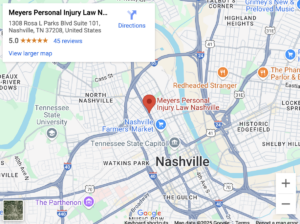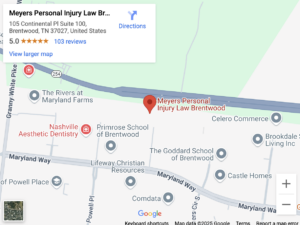Chad Meyers | January 24, 2024 | Personal Injury

Receiving a settlement check is often the conclusion of a legal or insurance claim process. When an individual or party wins a legal case or settles a dispute, they are typically awarded a lump sum as compensation. Unlike standard checks, settlement checks can involve larger sums of money, requiring a clear understanding of the cashing process to ensure that funds are accessed without any complications. If you’ve been involved in a legal case or settlement, contacting trusted Nashville injury attorneys that can help you navigate the settlement process and ensure you receive the compensation you’re entitled to.
Cashing a settlement check might require different steps depending on the institution or the size of the check. Most banks have certain policies in place for handling larger checks to prevent fraud and ensure the availability of funds. Knowing these procedures and preparing accordingly can make the process smoother. It is essential for the recipient to have the appropriate identification and to be aware of their bank’s policies on check deposits and clearance times.
Understanding Settlement Checks in Tennessee
Settlement checks are financial instruments issued to a claimant as a result of a legal agreement or court order. They represent a monetary award to the claimant in resolution of a dispute.
Definition and Overview
Settlement Checks are tangible drafts provided to an individual or entity as a fulfillment of damages awarded either from a legal settlement or a court verdict. They are typically issued by the payer’s financial institution and represent the agreed-upon sum of money that the payee is entitled to receive. These checks require a secure and verifiable process to cash or deposit, similar to other large-sum checks to ensure the legitimacy and finality of the transaction.
Types of Settlement Checks
Settlement checks can vary depending on the nature of the legal case or agreement. They generally fall into the following categories:
- Compensatory Settlement Checks: Issued for compensating claimants for injury, loss, or damages they incurred.
- Restitution Settlement Checks: Intended to reimburse expenses that the claimant had to cover due to the actions of the defendant.
- Punitive Settlement Checks: Assigned when the defendant is required to pay beyond the compensatory damages as a form of punishment.
- Class Action Settlement Checks: Distributed to group members of a class action lawsuit, often reflecting a pro-rated share of the total settlement.
Each type stipulates different taxation and cashing procedures that claimants need to be aware of before proceeding with the cashing process.
Pre-Cashing Considerations
Before attempting to cash a settlement check, it is vital to establish the check’s legitimacy, understand tax implications, and learn about the payer. These steps ensure the transaction’s legality and prepare the recipient for potential financial impacts.
Verify the Check’s Validity
Validity of the Check: A recipient must confirm that the check is authentic. They should inspect the check for its issue date, payee information, and the payer’s signature. Bank Confirmation: Contacting the bank on which the check is drawn is recommended for verification. Check details such as the account number and routing number can be validated with the bank to avoid any potential fraud.
Consider the Tax Implications
Taxable Income: Settlements can sometimes be taxed as income. If the settlement is related to a lawsuit or employee compensation, the individual should verify if it’s taxable. Consult a Tax Expert: An accountant or tax attorney should be consulted to accurately assess any taxes owed. Quick reference:
| Settlement Type | Generally Taxable? |
|---|---|
| Personal Injury | No |
| Employment Compensation | Yes |
Know the Payer
Reputation and Solvency: Researching the payer’s financial stability and reputation is crucial. If the payer is a company, one may review its financial history and any public records of past settlements. Contact Details: Ensure that the payer’s contact details are correct. This information aids in resolving any potential issues that might arise during the cashing process.
Endorsement and Identification
To cash a settlement check, the recipient must properly endorse the check and present valid identification that aligns with the name on the check.
Required Identification
One must present a government-issued photo ID such as a driver’s license, state ID, or passport. The name on the ID must match the name on the check. In some cases, secondary identification may be requested; this could include a credit card, social security card, or utility bill.
Endorsement Process
The check must be endorsed by signing the back in the designated area. The endorsement should exactly match the recipient’s name as it appears on the front of the check. If the check is made out to multiple parties, all must endorse the check. If the check is payable to a minor, a guardian might endorse on their behalf.
Choosing Where to Cash
When cashing a settlement check, the individual should consider the fees, convenience, and processing time involved. Selecting the right location is essential for a hassle-free transaction.
Banking Institutions
Banking Institutions typically offer check cashing services for account holders with either no fee or a low fee. An individual with an account can expect same-day availability of funds in many cases, depending on the bank’s policy and the check amount. Required identification may include a driver’s license or passport.
Check-Cashing Services
Check-Cashing Services offer a quick way to cash a settlement check without the need for a bank account. These services, however, usually charge a percentage of the check amount as a fee. For larger settlement checks, these fees can become substantial. Customers should be prepared to provide proper identification, such as a government-issued ID card.
Cashing the Check
Cashing a settlement check typically involves choosing from several options, each with its own procedures and requirements. The chosen method can depend on factors such as the availability of banking services, the size of the check, and the individual’s need for immediate access to the funds.
At Your Bank
When cashing a settlement check at one’s bank, the individual should first ensure their account has enough funds to cover the check in case of a hold. They should present the check along with their identification to a bank teller. The process usually involves:
- Depositing the check into their account
- Waiting for the funds to clear, which can take several days
- Withdrawing the funds once cleared
At the Issuing Bank
Cashing a settlement check at the issuing bank can be an alternative if immediate access to funds is needed. The individual will need to:
- Visit the bank that issued the check
- Provide valid identification
- Pay any applicable check-cashing fees which will vary by bank
Using a Check-Cashing Service
If one lacks a bank account or requires immediate cash, a check-cashing service may be utilized. They should be prepared to:
- Present the settlement check and ID at the service counter
- Expect to incur higher fees than a bank might charge, typically a percentage of the check amount
- Receive cash immediately after the service verifies the check
Check-cashing services are convenient but often come with higher costs, which should be considered before using them.
Potential Issues and Solutions
When cashing a settlement check, individuals may encounter certain hurdles. Addressing these issues effectively is crucial to ensuring quick access to the funds.
Holds on Funds
Issue: Financial institutions often place holds on large checks to verify funds. This can delay access to the funds.
Solution: To reduce hold times, one may:
- Deposit the check with a teller rather than via an ATM, allowing for personal interaction and potential for negotiation on the hold duration.
- Consider opening a new account where the funds are immediately available for at least part of the settlement amount.
Check Authentication Problems
Issue: Banks may suspect fraud and refuse to cash settlement checks if they cannot verify legitimacy.
Solution: Important steps include the following:
- Bring identification and any settlement documentation to the bank to prove one’s identity and the authenticity of the check.
- Contact the issuing party in advance and confirm they are ready to verify the check if the bank contacts them.
Dispute Resolution
Issue: Disputes over settlement amounts or payee information can prevent check cashing.
Solution: Carefully:
- Review and confirm the check details before leaving the issuing institution to catch errors early.
- Communicate promptly with the issuing party to correct any discrepancies. Keep records of correspondence to resolve issues efficiently.
After Cashing the Check
Once the settlement check is successfully cashed, the recipient needs to focus on proper allocation of the funds. This includes both managing the immediate financial influx and setting up long-term financial stability.
Managing Your Funds
Immediate Actions:
- Deposit the funds into a checking or savings account.
- Review the bank statement to ensure the deposited funds reflect accurately.
Maintaining Control:
- Create a budget to manage expenses and prevent overspending.
- Set aside a portion for necessary payments, such as debts or bills.
Financial Planning and Investment
Developing a Financial Plan:
- Consult with a financial advisor to create a plan that addresses the recipient’s goals and needs.
- Explore different savings accounts or fixed deposits that offer favorable interest rates.
Investment Strategies:
- Diversify investments to minimize risks and maximize returns.
- Consider retirement accounts like IRAs or 401(k)s for long-term growth potential.
Contact Our Nashville Personal Injury Law Firm Today at Meyers Personal Injury Law
If you were injured in an accident in Nashville or Brentwood and need legal help, contact our Nashville personal injury lawyers at Meyers Personal Injury Law to schedule a free case review today.
Meyers Personal Injury Law Nashville
1308 Rosa L Parks Blvd Suite 101,
Nashville, TN 37208
(615) 258-9000

Meyers Personal Injury Law Brentwood
105 Continental Pl Suite 100,
Brentwood, TN 37027
(615) 258-9000
About the Author Chad Meyers

Chadwick D.G. Meyers is the founding attorney of Meyers Personal Injury Law. He earned his J.D. from the Nashville School of Law and focuses his practice on serious personal injury cases involving car accidents, wrongful death, funeral home negligence, and more.
Chad is frequently consulted by attorneys nationwide on complex claims and has been recognized by The National Trial Lawyers and other legal organizations. Click here to view some of the successful case results Chad has achieved for his clients.



